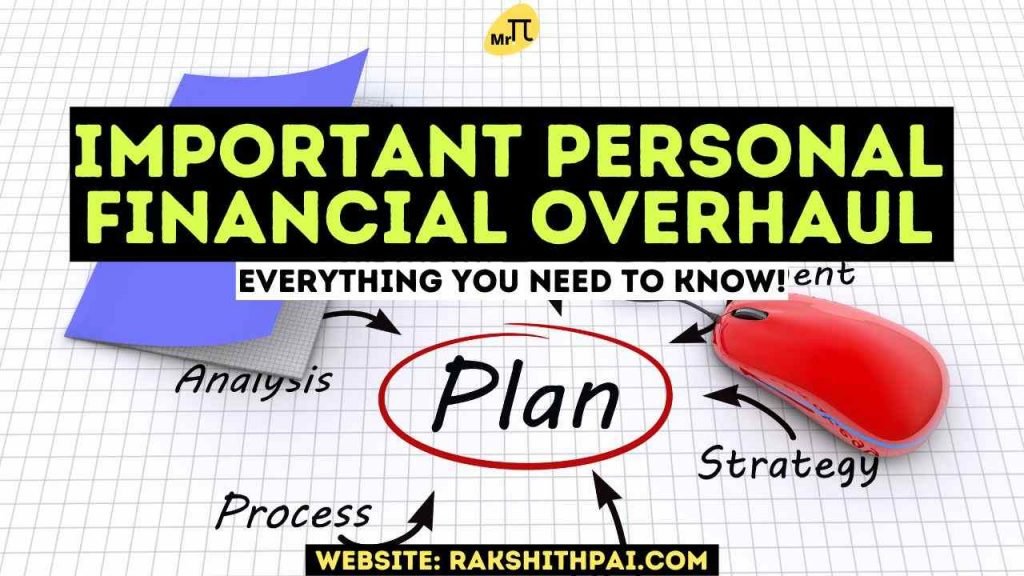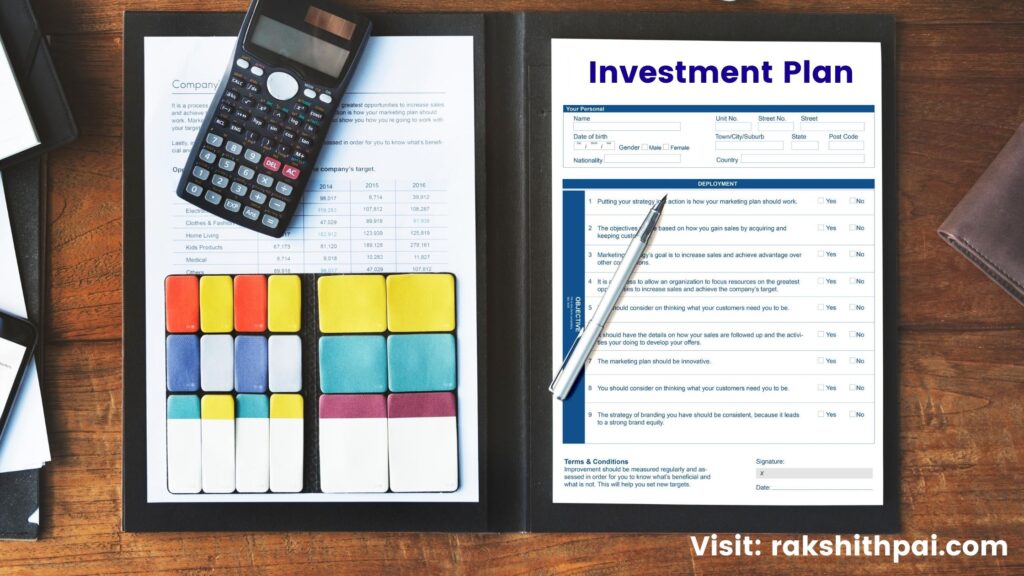Table of Contents
What Does Personal Financial Overhaul Means?
An overhaul is to examine something thoroughly. Personal Financial Overhaul is to direct our attention toward our Personal Finances. And, to audit the same in order to rectify mistakes if any. The sole purpose of auditing our personal finance is to achieve our desired financial goals without any disturbances.
Seven (7) Important Personal Finance Overhaul:
Budget your Finances
An in-depth, achievable, and long-term budget is the most effective tool for restoring financial stability. While it may seem obvious, financial stress may lead to a never-ending cycle of anxiety and debt for many people.
In order to create a workable budget, it’s important to avoid making too optimistic projections about how much additional money you’ll make and how much you’ll be able to save. Instead, your budget should be used to keep track of and represent your financial situation as clearly as possible. The first step to becoming financially independent is to take an honest look at your income, expenses, and savings potential.
First, you should make a spreadsheet (you can use Google Sheets or Microsoft Excel). Monthly costs should be listed in the far left column. For example, Look at the following aspects;
Ask These 10 Questions to Yourself:
- What is my Income to Savings rate?
- How much is my living cost? Is the cost justifiable?
- How much am I spending on Mortgage/Rent?
- Do I have Personal Insurance? If yes, what does it covers?
- Am I in Debt? If yes, How long will I take to get out of it?
- When do I usually shop? How much do I spend each month?
- What are my basic necessities? Do I have money saved to meet my basic necessities?
- Am I filing tax? If yes, How efficient am I in saving my tax expenses?
- Am I investing in my well beings? Both Physical & Psychological.
- Am I Investing for Retirement & Financial Independence?
To learn more about “Budgeting and Its Importance”, Check this article. CLICK HERE!
Plan your Investments
It takes more than picking a few stocks to invest in to create a viable investment strategy. Both your current financial state and your future aspirations need to be taken into account. Determining your ideal asset allocation also requires defining your time horizon and your risk tolerance. These measures will reduce the impact of any potential stock market losses. Therefore, it is crucial to have a well-thought-out strategy before putting your own money at risk. This may necessitate extensive study or the assistance of a financial expert familiar with your specific position.
Developing your investment strategy requires you to determine how much risk you are willing to take. If you’re young, your portfolio has time to recoup from any losses, so you can afford to take on more risk. Those of us getting on in years are better off avoiding high-risk investments and putting more money in at the start to kickstart our growth.
Emergency Fund
Starting an emergency fund to meet unforeseen expenses is another smart way to reduce financial stress. If you are in a lot of debt and not making enough money to save, it can be difficult to imagine ever having a large emergency fund. However, if you set aside at least Rs.5,000 a month, you’ll soon have a respectable emergency fund. To get things going, you may want to sell some old clothes, books, unused gadgets, or other goods you haven’t touched in years.
Until you can get out of debt, it’s a good idea to save at least Rs. 10,000 (or any such amount that you find worthwhile) in case of an unexpected need. Once you’re able to put away a little bit each month, strive to have enough money saved up to cover three to six months of your living expenses in case of an emergency (use the budget you made above to calculate this).
Many sources of anxiety can be mitigated by establishing an emergency fund. It will give you the confidence and assurance to retain your calm even under extreme pressure. The money is there if you need it for anything unforeseen, like a car repair or a last-minute vacation to see relatives. Thus, you won’t have to resort to high-interest loans or credit card charges that you can’t afford to make minimum payments on.
Avoid Immediate Comforts
How many of us, upon receiving a raise or a new position, immediately think, “Yes! More money to spend!”
In the opinion of those versed in matters of finance, this is a common blunder. If you are making a decent wage in an entry-level position, you are by no means flush with cash. However, if your salary has increased several times over the years and you have always put the extra money you receive every two weeks toward a loan instead of savings, What’s the benefit of such a hike in salary?
Hence, it is important to sit down and examine our finances and determine where we stand financially. And, instead of chasing after comforts at the start of our careers, it is suggested that we postpone buying an iPhone, a new car or bike, or even a flat at a prime location. This is especially the case when all of this is funded through your company’s EMI plans.
Side Hustle
The advent of the remote workforce has made it easier than ever to start a second job from the comfort of home. There are many ways to make decent extra money, depending on your needs and skills.
These professions allow carers to supplement their income, fill the time between full-time positions, or make ends meet while still being available to their loved ones.
Though some supplemental income streams are more fruitful than others, most don’t hurt. Making sure that taking on a second job will be productive is essential. The perfect side hustle is the one that fits your needs, skills, and time limits right now.
10 Best Ways to Make Money Online:
Seek Professional Advice
The shame and guilt associated with financial difficulties can be the most tiring aspects of the situation for many people. In our materialistic culture, it can be embarrassing to confess that you are not rich, much less that you are having trouble making ends meet.
If you want to get out of debt and reduce your stress, you must conquer this phobia. Credit counseling, financial planning, and debt management advisors are just some of the options available to help you regain control of your finances. Some websites about money, like “rakshithpai.com,” offer free advice on how to pay down debt and balance your budget, even though their main goal is to help you invest your money.
Examining these options thoroughly is time well spent. The benefit here is not just the expert guidance and assistance you’ll receive, but also the relief you’ll bring to your loved ones. Even though it’s important to talk about your financial situation openly and honestly with the people you care about, a professional counselor’s suggestions can help relieve some of the stress that comes with trying to find a solution. Talk to your Chartered Accountant (CA) or Financial Advisor for more information.
Track Progress
We’ve come full circle, back to square one, the initial plan of attack. Maintaining a close eye on your budget and making necessary adjustments to make sure it matches your actual financial situation is essential throughout the entire process we’ve outlined here. Make a note of the reduction in debt and financial strain as you make progress.
Instead of worrying and living in the dark about your financial situation, you can put that worry to rest and start developing a healthy relationship with money. Incentives are not just for other people; you can give them to yourself as a reward for your efforts. If you save Rs. 10,000 (as said earlier), you could treat yourself to a good, tasty lunch by spending Rs. 1,000 or so.
15 Best Ways to Save Income Tax in India:
Conclusion:
We all know that the first step is the most challenging. Just as when you go for a stroll, it is also true when you decide to completely revamp your financial life. Don’t stress, instead plan your next 14 days after reading this article. Then, plan for the next 3 months’ finances and then slowly act.
Financial order can be restored in as little as two weeks with the help of a guide. Every day, smaller tasks await you. The first day focuses on examining how your revenue compares to your outgoings. You wake up the next day with a plan for keeping tabs on your finances. The two-week schedule allows you to grasp each step and set up a system without feeling overwhelmed, despite the fact that many of the components could likely be assembled in a single day.
I wish you luck.
For More Information, Check this Video:
Disclaimer: All the information on this website is published in good faith and for general information purposes only.









